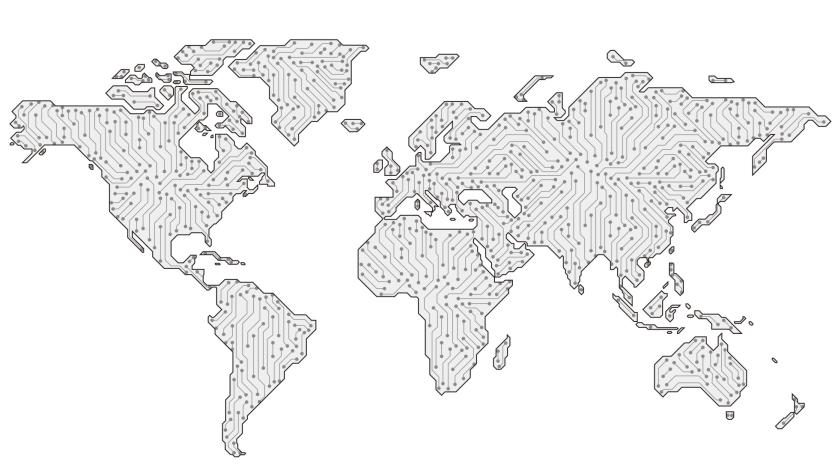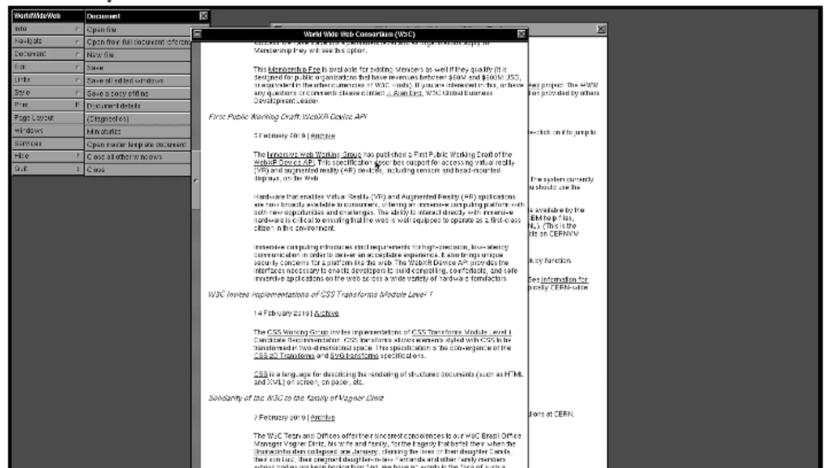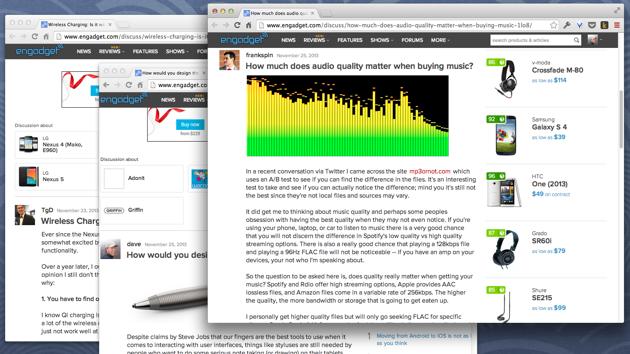world wide web
Latest

Tim Berners-Lee is auctioning off the web's source code as an NFT for charity
Web pioneer Tim Berners-Lee will auction the original code for the modern internet as an NFT.

This week in tech history: The birth of the internet and the first telephone call
At Engadget, we spend every day looking at how technology will shape the future. But it's also important to look back at how far we've come -- that's what This Week in Tech History will do. Join us every weekend for a recap of historical tech news, anniversaries and advances from the recent and not-so-recent past. This week, we're looking back at the creation of the internet, the first successful telephone call and the birth of the man who shaped modern physics as we know it.

CERN lets you surf the web like it's 1990
We take the relative seamlessness of the internet for granted these days -- it's easy to forget that surfing the web was once a fairly clunky and convoluted affair. But for those hankering for a bit of tech nostalgia -- or who can't conceive a world where you had to double click on hyperlinks -- a team at CERN has rebuilt the original 1990 WorldWideWeb browser, which can be explored within a regular browser.

After 54 years as vaporware, the web's oldest ancestor is released
In 1960 Ted Nelson, the man who coined the term "hypertext", began work on his magnum opus -- Xanadu. In late April, after 54 years of development, the complex document builder and viewer was finally released with little to no fanfare at a Chapman University event. The concept behind the software should seem pretty familiar: documents could be embedded with clickable links that led you to directly to the quote or referenced information within another document. Clicking wouldn't close the primary document though, instead all of the source material is displayed simultaneously, shrinking down to stay out of the way, or scaling up for side-by-side comparisons when you need it. Had it not been for an unfortunate series of setbacks, we could have been talking about Ted Nelson as the father of the World Wide Web, instead of Tim Berners-Lee. But a lack of resources, especially money, meant that development dragged on for decades. Nelson doesn't think Xanadu is dead on arrival, though. While it may be too late to conquer the web, he believes it could take on the mighty PDF. The color-coded links and direct connections to reference material could prove quite useful in legal or research documents. Not to mention a handy way to archive web sites.

Daily Roundup: Fire TV review, our first time on the web and more!
You might say the day is never really done in consumer technology news. Your workday, however, hopefully draws to a close at some point. This is the Daily Roundup on Engadget, a quick peek back at the top headlines for the past 24 hours -- all handpicked by the editors here at the site. Click on through the break, and enjoy.

My First Time on the World Wide Web
The World Wide Web. It sounds like such a silly thing when you actually spell out those consecutive W's. Nowadays, we just say "the internet," but once upon a time the web was a new and exciting thing. It was a massive communications breakthrough that captivated minds both young and old with the promise of an "information superhighway," and forced us to endure achingly slow dial-up connections. Last month, the web turned 25 years old. Yes, Tim Berners-Lee's simple creation has gone on to spawn this digitally connected world we live in: the social networks, mega e-tailers and search engines we all know and depend on today. Things were simpler when the web started out, but we assure you, our early experiences were no less weird.

Feedback Loop: Earliest internet memories, first tweets and more!
Welcome to Feedback Loop, a weekly roundup of the most interesting discussions happening within the Engadget community. There's so much technology to talk about and so little time to enjoy it, but you have a lot of great ideas and opinions that need to be shared! Join us every Saturday as we highlight some of the most interesting discussions that happened during the past week. This week, we celebrated the 25th anniversary of the world wide web, shared our first tweets, discussed the fashion appeal of wearables and started a March Madness tournament bracket. Head on past the break and join the conversation.

Daily Roundup: Garmin Vivofit review, Amazon raises the price of Prime, and more!
You might say the day is never really done in consumer technology news. Your workday, however, hopefully draws to a close at some point. This is the Daily Roundup on Engadget, a quick peek back at the top headlines for the past 24 hours -- all handpicked by the editors here at the site. Click on through the break, and enjoy.

This list is brought to you by 25 years of the world wide web
When Tim Berners-Lee penned a memo to his boss at CERN in March 1989, he was looking for a better way to manage information about complex evolving systems. He proposed an interconnected network of information that would improve communication at the facility, but there was no way of knowing what a tangled web we would weave. That memo would eventually spawn the world wide web and the various memes, crowdfunded gadgets and user-generated porn sites that it made possible. Hell, you wouldn't be reading Engadget if it weren't for Sir Berners-Lee. In homage to that great network of information that we all know and surf today, we present you with 25 things made possible by the big ole' W3.

Insert Coin: Connectify Dispatch lets you put all your internets together into one big internet (video)
In Insert Coin, we look at an exciting new tech project that requires funding before it can hit production. If you'd like to pitch a project, please send us a tip with "Insert Coin" as the subject line. If you've ever thought "Hey, my internet is pretty slow, maybe I can get a second line and combine them into one big, zippy connection!" then you're not alone -- those of us who are broadband-deprived need all the help we can get. But a quick tour through Google will show you the difficulty of doing that process, called "bonding," at home. So, Connectify has proposed Dispatch, software that lets you easily combine your WiFi, ethernet and 3G/4G into a single, fat pipe, at a reasonable cost. The company brings along wireless sharing know-how from its Hotspot product to the project, and promises that with every connection you combine, you'll get a corresponding bump in throughput. Also, the system will automatically failover to a good connection if one goes on the fritz, and even switch automatically between WiFi and 3G/4G to maximize speed and save money. To prove the tech, the company combined all the available open WiFi networks in a neighborhood along with a tethered Verizon mobile phone, and were able to create an impressive 85Mbs connection, as the video below the break shows. So far, Connectify has vacuumed up $30K for Dispatch toward the $50K objective, with about two weeks left. So, if you're desperate for more speed, or just want to trump your neighbor's bandwidth by stealing his WiFi and melding it with your ADSL, check the source to see how to pledge.

Good Technology debuts 'first secure browser' for enterprise Android deployments
Good Technology is touting the latest addition to its Good Mobile Access (GMA) Android software suite, a secure browser. The company's GMA offering gives corporate foot soldiers armed with a smartphone access to secure intranet resources without having to initiate a VPN session -- while simultaneously allowing IT folks to manage mobile ingress. By bringing a browser into the fold, Good's software will allow employees to access databases, resources and collaboration tools without ever having to leave the safe confines of GMA's sandbox. The software maker is targeting outfits with a bring-your-own-device policy in place (and war chests large enough to install the necessary back-end infrastructure). If you're interested in learning more, the full release awaits your review after the break.

Microsoft's 'HTTP Speed + Mobility' aims to make the web faster, could be the next big ping
We're generally satisfied with our internet performance, but we wouldn't say no to a speed boost. A Microsoft blog post reveals plans to enable just that, with the company's proposed "HTTP Speed + Mobility" approach to HTTP 2.0. Have you thought about what life would be like with a faster internet? MS says Y-E-S! "There is already broad consensus about the need to make web browsing much faster," the company proclaimed. Juicy. The suggested protocol will, well, focus on achieving greater speed, but Microsoft hasn't detailed exactly how it will accomplish that, beyond mentioning that it's based on the Google SPDY protocol, which on its own aims to reduce latency and congestion by prioritizing requests and removing the limit on simultaneous streams over a single TCP connection. For its part, MS says it will be expanding on SPDY to "address the needs of mobile devices and applications," which we presume would be in Google's best interests as well. It's safe to say that Microsoft's being a bit more forthcoming during its meetings with the Internet Engineering Task Force (IETF) this week -- the organization responsible for creating HTTP 2.0 -- so perhaps we'll be hearing more about this fabled faster internet before we turn anew to Q2.

Visualized: an interactive timeline of the web
Ever wondered what the World Wide Web's illustrious history would look like if plotted in timeline form? Well, thanks to Google's "Evolution of the web," you won't have to. The delectable chart traces the evolution of HTML, the web technologies that came alongside it and the browsers that've held it all together -- all in a seriously meta HTML5 package. Ready for a trip down memory lane? Hit the source, friend, and revel at how far we've come.

World Wide Web turns 20, finally shakes that acne problem
Happy birthday, World Wide Web! Hard to believe you're turning 20 already. It seems like just yesterday we were hearing the pitter patter of little dial-up, delighting at the words "you got mail," and getting frustrated when calling our friends and receiving that dreaded busy signal. You're all grown up now, helping people learn how to farm and become overnight pop sensations. What, we wonder, will the next 20 years bring? At the very least, you'll eventually have to move out of your parents' basement, get a real job, and settle down. It's hard to pay attention to that kind of stuff, though, when you've got another year of sneaking beers ahead of you. So go ahead, World Wide Web, enjoy yourself tonight -- just make sure to be home by midnight.

Is Apple 'killing the World Wide Web'?
That's a really nice internet you have there. It'd be a shame if anything were to happen to it. That's the threat Apple's app-centric approach has leveled against the World Wide Web as we know it, according to Roger McNamee, co-founder of the private equity firm Elevation Partners. "There's a titanic clash for control of the internet. Fundamentally, this is between the world-wide web on the one hand and Apple's app model on the other," McNamee told CNBC in an interview. "Right now Apple is just killing the World Wide Web. Apple will do almost 100 million [iPads and iPhones] this year -- the numbers are staggering." McNamee contrasted Apple's "staggering" success with two of the biggest players in the internet space: Microsoft and Google. Apple's iPhone and iPad are eroding Microsoft's once formidable stranglehold of the web. For example, McNamee says the Redmond-based company's share of internet-connected devices will fall below 50% this year -- down from 97% a decade ago. Similarly, McNamee thinks Google, who he characterizes as a good company and leader of the world-wide web group, is losing its influence. Google's primary search business is losing ground to specialized sites like Wikipedia, Facebook, Twitter, and Yelp. Much like Microsoft, Google has watched its 90% share of the search market shrink to less than half in the last few years. The Elevation Partners co-founder said Google's core challenge is overcoming limitations in the underlying software for the web, HTML, which hasn't changed for a decade. But, he says, Android is "too wild west" to be successful. Google will need to address some significant security concerns and prove the platform can support a commercially-viable ecosystem for developers and hardware manufacturers before it can be considered a long-term challenger. Meanwhile, Apple's app model offers an innovative new approach to deploying engaging content and experiences to the web. As more customers buy iPhones and iPads, the Cupertino company will build momentum at the expense of its rivals. He sees the company entering a 10-year cycle of growth that will boost the technology sector as a whole. Is Apple killing the web as we know it or simply making a killing with its popular mobile devices? Keep reading to state your case in the comments or watch the CNBC interview with McNamee.

Sir Tim Berners-Lee signs up to verily protect UK net neutrality
Here in the US we're still looking for a knight in shining armor to protect our free and open internet, but in the UK they've found their guy. Now they just need some plate mail. It's Sir Timothy John Berners-Lee, the man who first proposed the World Wide Web to the World Wide World in 1989. He'll be working with the UK's Broadband Stakeholder Group to ensure that any traffic management policies that go into effect are done with transparency and within a set of defined best practices. That is to say: corporations will still have an opportunity to address threats to the overall health of their networks, but they'll need to do so in an open way. Communications Minister Ed Vaizey summarized it thusly: That agreement should be guided by three simple principles. The first is users should be able to access all legal content. Second, there should be no discrimination against content providers on the basis of commercial rivalry and finally traffic management policies should be clear and transparent. So, that's good news for those across the pond. Here in the US, well, we'll just keep braiding our hair and singing out the tower window as loudly as possible. Or maybe it's time to give Tim Wu a sword. [Photo credit: Paul Clarke]

W3C tests HTML5 browser compatibility, crowns IE9 the champ
The World Wide Web Consortium -- you know, the team responsible for certifying and standardizing HTML5 -- has put together its first table of official conformance test results, giving us an idea of how well prepared each of the most popular browsers is for the oncoming web standards revolution. The data show Internet Explorer 9 as the most adroit performer (again), though Chrome, Firefox, Opera, and Safari don't seem to be too far behind in their HTML5 compliance, either. Of course, these checks don't cover the entire spec, which in itself isn't even finalized yet, but they provide us with a glimpse into a brave new world where Microsoft actually cares about coders keen on maximizing interoperability by adhering to web-wide standards. Good stuff. Check out the full results at the source link below. [Thanks, Mehran]

Internet Explorer falls below 50 percent global marketshare, Chrome usage triples
Oh, IE, it pains us to do this to you. You who once so mightily won in the battle against Netscape Navigator now seem to be losing your war against a battalion of upstarts, relatively fresh faces like Firefox and Chrome. According to StatCounter, IE's global usage stats have fallen to 49.87 percent, a fraction of a tick beneath half. Firefox makes up the lion share of the rest, at 31.5 percent, while Chrome usage tripled since last year, up to 11.54 percent. Two years ago IE had two thirds of the global market locked down, and even if Internet Explorer 9 is the best thing since ActiveX, well, we just don't see the tide of this battle turning without MS calling in some serious reinforcements. Update: If you needed more proof of Chrome's increasing popularity, we got a tip on this report from Softpedia confirming that Chrome is the fastest growing browser of the moment. Firefox is more or less flat and, well, you know all about how IE is faring.

The internet kill switch and other lies the internet told you
Last week, the Senate Committee on Homeland Security and Government Affairs, led by Senator Joe Lieberman (I-CT) became the subject of some debate when news spread that it was calling for a so-called "internet kill switch" which would give the President the power to shut down the whole darn thing in a state of emergency. Apparently, however, nobody bothered to do any research into the topic until very recently -- and of course, the truth is far more complicated than a horrifying phrase like "internet kill switch." Because as it turns out, according to the 1934 Communications Act (which is still in effect today), the President already has the power to shut down any and all telecommunications systems in situations he or she deems it necessary for national security, and Lieberman's call was for a reassessment of the Act. So what are Lieberman's evil plans for the 'net? His proposal, S. 3480, is a far more subtle document than the original act, which essentially says "hey, do whatever you have to do, man," and calls for the designation of cyberspace as a 'national asset.' It asks for the private owners of critical infrastructure to develop risk assessment plans, and plans to mitigate that risk, in conjunction with the Department of Homeland Security. There are also several recommended procedures called for in the event of an emergency, but none of them have anything to do with a mechanism to shut anything down, and the director would be expressly prohibited from requiring owners to use any specific mechanism. So... the exact opposite of a kill switch. Also, it's worthwhile to note that the entire proposition calls for these changes to be developed by the private sector itself, rather than imposed on it. Kind of makes the story a little less interesting, that's for sure. Hit up the source -- Talking Points Memo -- for a far more detailed, insightful account of what's actually going down.

World Wide Web creator sorry for the '//' and other things that don't matter
Tim Berners-Lee, the man credited with creating the World Wide Web, recently said that his only real regret about the whole shebang is forcing people to type out the (essentially unnecessary) double slash after the 'http:' in URLs. Speaking at a symposium on the future of technology, he noted (in reference to the dreaded marks) the paper, trees and human labor that could have been spared without them. Hey Tim: don't sweat it! You've done us enough good turns that we're willing to overlook it.












